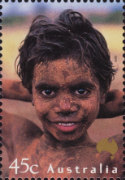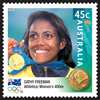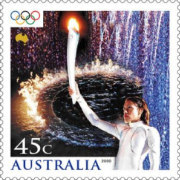History
Timeline results for 2000 to 2010
Found 215 results for your search. Showing page 1 of 11.
Year from 2000, year to 2010
2000
-
The Council for Aboriginal Reconciliation identifies a treaty as the unfinished business of the reconciliation process and recommends “that the Commonwealth Parliament enact legislation... to put in place a process which will unite all Australians by way of an agreement, or treaty, through which unresolved issues of reconciliation can be resolved.”
-
Cathy Freeman wins gold in the women’s 400m at the Sydney 2000 Olympics. The opening and closing ceremonies celebrated Indigenous cultural identity and history and provided some deft political comment on contemporary Aboriginal issues.
-
An Aboriginal Tent Embassy is set up in Sydney during the Olympic period to attract world media attention to Australian Indigenous issues.
-
The Council for Aboriginal Reconciliation ceases to operate by the end of 2000. It is to be replaced by a new national body, Reconciliation Australia, in 2001.
-
The Royal College of Surgeons of Edinburgh, UK returns 500 remains.
-
Australia appears before the United Nations Committee on the Elimination of Racial Discrimination. The Committee criticises the Commonwealth Government's inadequate response to recommendations of the Bringing Them Home Report: "While noting the efforts by the State party to address the tragedies resulting from the previous policy of removing indigenous children from their families, the Committee remains concerned about the continuing effects of this policy. The Committee recommends that the State party intensify these efforts so that the victims themselves and their families will consider that they have been afforded a proper remedy."
-
Inquiry into the federal government's implementation of the recommendations made by the Human Rights and Equal Opportunity Commission in Bringing Them Home undertaken by the Senate Legal and Constitutional References Committee results in the Healing: A Legacy of Generations Report.
-
Prime Minister John Howard rejects a treaty noting a "nation … does not make a treaty with itself".
-
A poll finds 53% of Australians favoured a treaty, with 34% opposed.
-

Portrait of young Cyril Watson. One of the 25 unique photographs of Australians from everyday life in the Faces of Australia issue is Cyril Watson, a young girl from remote Central Australia.
-
Australia appears before the United Nations Committee on the Elimination of Racial Discrimination. The committee criticises the government’s inadequate response to recommendations from the Bringing Them Home Report.
-
The government denies that a 'Stolen Generation' exists in a submission to the Senate inquiry on compensation for children forcibly removed. It stated: "The government is concerned that there is no reliable basis for what appears to be a generally accepted conclusion as to the supposed dimensions of the 'stolen generation'. [...] At most, it might be inferred that up to 10% of children were separated for a variety of reasons, both protective and otherwise, some forcibly and some not. This does not constitute a 'generation' of 'stolen' children. The phrase 'stolen generation' is rhetorical." [1]
-
The Queensland Aboriginal & Islander Legal Service Secretariat (QAILSS) collects testimony from more than 2,000 people who want to take action against the government for missing, unpaid and underpaid monies.
-
Corroboree 2000 is held at Sydney Opera House to mark 10 years of work on reconciliation. Here, the Council for Aboriginal Reconciliation presents to the nation Corroboree 2000 - Towards Reconciliation which includes the documents ‘Australian Declaration towards Reconciliation’ and ‘Roadmap for Reconciliation’. The roadmap outlines four national strategies to advance reconciliation.
-
More than 250,000 people cross the Sydney Harbour Bridge in the People’s Walk for Reconciliation which lasted almost six hours. It became the largest political demonstration ever held in Australia. A week later, about 60,000 people crossed the William Jolly Bridge in Brisbane. Many smaller walks followed in state capitals and regional towns across Australia. Big marches in Melbourne and Perth at the end of the year attracted as many as 300,000 people.
-

Stamp commemorating Cathy Freeman's win over 400m. Australia Post's Australian Gold Medallists issue shows the first stamp of a living Aboriginal person. Until 1997 no living person (Royal family excluded) was featured on Australia’s stamps. Athlete Cathy Freeman is the only Aboriginal person who has been individually honoured on a stamp in such a way.
-

The 45c stamp featured Cathy Freeman holding the Olympic torch. This stamp issue features Cathy Freeman lighting the Olympic Flame at the opening ceremony of the XXVII (27th) Olympic Games in Sydney. The stamp was voted the most popular in the 2000 Australia Post Stamp Poll.
2001
-
A cabinet submission prepared by then Minister for Community Services, Faye Lo Po, reveals 69 million dollars were stolen from 11,500 Aboriginal people by successive NSW governments from 1900 to 1970. The submission was never tabled, but leaked to the National Indigenous Times newspaper in 2004.
-
The Northern Territory overturns its mandatory sentencing laws.
-
The Yeperenye Federation Festival outside Alice Springs becomes the largest corroboree ever staged in Australia, involving more than 25,000 people of 40 Indigenous nations. The programme is a celebration revolving around the theme of the Yeperenye (Caterpillar) Dreaming story and federation as seen from an Aboriginal perspective.
References
View article sources (1)
[1]
John Herron, 'A generation was not stolen' (federal government's submission to the Senate inquiry), The Sydney Morning Herald, April 4, 2000


